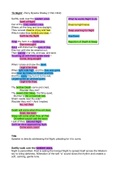‘To Night’ -Percy Bysshe Shelley (1792-1822)
Swiftly walk over the western wave, What he wants Night to do
Spirit of Night!
Out of the misty eastern cave, Dreams/nightmares
Where, all the long and lone daylight,
Thou wovest dreams of joy and fear, Deep yearning for Night
Which make thee terrible and dear,—
Swift be thy flight! Day/Dawn
Wrap thy form in a mantle gray, Rejection of Death & Sleep
Star-inwrought!
Blind with thine hair the eyes of Day;
Kiss her until she be wearied out,
Then wander o’er city, and sea, and land,
Touching all with thine opiate wand—
Come, long-sought!
When I arose and saw the dawn,
I sigh’d for thee;
When light rode high, and the dew was gone,
And noon lay heavy on flower and tree,
And the weary Day turn’d to his rest,
Lingering like an unloved guest,
I sigh’d for thee.
Thy brother Death came and cried,
Wouldst thou me?
Thy sweet child Sleep, the filmy-eyed,
Murmur’d like a noontide bee,
Shall I nestle near thy side?
Wouldst thou me?—And I replied,
No, not thee!
Death will come when thou art dead,
Soon, too soon—
Sleep will come when thou art fled;
Of neither would I ask the boon
I ask of thee, beloved Night—
Swift be thine approaching flight,
Come soon, soon!
Title
Speaker is directly addressing the Night: pleading for it to come.
Swiftly walk over the western wave,
Night is personified. Poet is asking the tranquil Night to spread itself across the Western
sky to bring darkness. Alliteration of the soft ‘w’ sound slows the rhythm and creates a
soft, calming, gentle tone.
, Spirit of Night!
Passion, excitement, calls Night with anticipation. Alliteration of hard ’t’ sound shows the
intensity with which he desires the Night.
Out of the misty eastern cave,
During the day, Night sits alone in a dull, mysterious cave to stay hidden. Night is avoiding
day (sun rises in the east).
Where, all the long and lone daylight,
Alliteration of the long, soft ‘l’ sound emphasises the long day that Night has to sit
through and wait for it to end.
Thou wovest dreams of joy and fear,
Whilst in the cave, Night creates dreams for people for when they sleep. Dreams can be
either good or bad.
Which make thee terrible and dear,—
Nightmares vs dreams (Night has the power to create happiness and terror for humans).
Dash functions as a dramatic pause introducing the speaker’s plea for Night to come.
Swift be thy flight!
Night must come quickly.
Stanza
The speaker is longing/yearning for the Night.
Wrap thy form in a mantle gray,
Speaker is asking Night to metaphorically wrap itself in a grey shawl.
Star-inwrought!
Stars are delicately embroidered in the shawl. Metaphor: Night compared to a night cloak
(both dark and covered in stars). Speaker is asking Night to spread stars across the sky.
Blind with thine hair the eyes of Day;
Day is also personified. Speaker is asking Night to cover Day’s eyes with its dark hair so
that Day can no longer see and Night will therefore have to come.
Kiss her until she be wearied out,
Night must overwhelm Day with so many kisses until it becomes tired and has to sleep/
go away.
Then wander o’er city, and sea, and land,
Night must wander everywhere (vast).
Touching all with thine opiate wand—
Night carries a magical, whimsical staff that puts people to sleep (empowers Night).
Speaker sees Night as mystical and euphoric.




